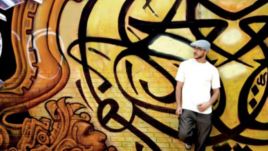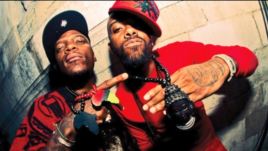分享到
Welcome to EXPLORATIONS in VOA Special English. I'm June Simms. Protest songs are part of the fuel of revolutions. Today, we talk to three rappers who played an active part in the Arab Spring revolutions and America's Occupy protests.
(MUSIC: "Rayes Lebled")
A new generation of musicians helped give voice to the popular uprisings in 2011 that came to be called the Arab Spring.
In Tunisia, the rapper known as El General, Hamada Ben Amor, uploaded a song to YouTube in November of 2010. He called it "Rayes Lebled," meaning "president of the country" or "head of state." It criticized the government of Zine El Abidine Ben Ali with lines like "Mr President, your people are dying" and "I see injustice everywhere."
The song quickly became popular among Tunisians as they began to protest against high unemployment, rising food prices and corruption. El General's music helped express the demands of protesters following the death of Mohamed Bouazizi.

He was a 26-year-old Tunisian who sold fruits and vegetables on the street in Sidi Bouzid. In December of 2010 he set himself on fire to protest police abuse. Tunisians rebelled, and the following month, their longtime president fled the country.
When the protests had spread, El General posted another song on YouTube, called "Tunisia Is Our Country" ("Tounis Bledna"). As a result, security forces detained him. But they freed him soon after Tunisians demanded his release.
(MUSIC: "Tounis Bledna")
Hamada Ben Amor has been singing about social and political issues and inequality since 2008. VOA's Faiza El-Masry asked El General if he had expected "Rayes Lebled" to become so popular.
EL GENERAL (TRANSLATED): "No I didn't. I just wrote from my heart and just wanted to defend the Tunisian people and express how they feel. And with God's help we got rid of the president and the government and every single Tunisian citizen shared the same feeling I expressed in the song. We were living in horror, not only us, all other people, like Egyptians, Libyans. We were all afraid of the governments. We wouldn't dream that we would get rid of them."
Now, he worries about the future. He says he hopes the suffering and sacrifices of young people will not be worthless. He hopes that the people in Arab nations will be happy with the governments that come to power. But one thing El General says he does not wish for is to enter politics.
EL GENERAL (TRANSLATED): "I'm an artist. I would never be a politician. In politics you have to be maneuvering and I like to be straightforward. That's why I prefer to be a singer, an artist."
The demonstrations in Tunisia helped create a new movement of Arab protests across North Africa and the Middle East. Egypt's longtime leader Hosni Mubarak and Libya's Moammar Gadhafi were also driven from power in 2011.
(SOUND: Protests in Yemen)
A yearlong uprising in Yemen forced President Ali Abdullah Saleh to leave office early in 2012 after 33 years in power.
El General is currently working with other musicians to denounce the violence in Syria.
(SOUND: Fighting in Syria)
Protests began there in March of 2011 and grew into armed conflict as the government tried to crush the popular uprising.
In the early months of the Syrian protests, there were reports about a young man named Ibrahim Qashoush. At protests, he would sing a popular song among opponents of Syrian President Bashar al-Assad. The song included lines like "It's time to leave, Bashar" and "Freedom is near."
Mr. Qashoush was found dead in the Orontes River in his hometown of Hama. His throat was cut and reports said his vocal cords were removed -- a message to anyone who might want to rebel or sing anti-government songs.
The Arab Spring movement spread with the help of social media like Facebook, Twitter and YouTube.
In Libya, activists used social media to report on the violence and protests that took place in the east. Khaled M is a rapper who was born in the United States to Libyan parents. He says the activists received training from a group of dissident Libyans living in the American state of Kentucky. He says they trained people in eastern Libya how to reach Western media through sites like YouTube and Google Voice.
Khaled M used some of those reports to later produce a video for his song "Can't Take Our Freedom." The song includes the British-based musician Lowkey, who was born to an Iraqi mother and British father.
"Can't Take Our Freedom" was released around two weeks after the protests in Libya began in February 2011. The song became popular among people in Libya.
In the darkest hours, when the world has turned away
And no one's watching, when the sky has turned to gray and
You have no options, when your voice is illegal
Only choice for the people
Is to stand up proudly in the face of death
It ain't a waste of breath when you speak up loudly
On behalf of the kids in the street with no pot to piss in
Living on their own 'cause their papa's missing
Don't know if his dead or he's locked in prison
Disappeared, they consider him the opposition
And now have a vision of dreams I shouldn't see
And could it be this close? Nah it couldn't be
But if the people in Egypt and Tunis can do this
Decide their fate, then why wouldn't we
More than 40 years we done rocked the nation
Under occupation we cannot be waiting
We can stop debating, when one of us dies
Ten jump in line ready to box the satan
You can't take our freedom or take our soul
Take our freedom or take our soul
You are not the one that's in control
You are not the one that's in control
La ilahe il Allah, no power's greater than God
Go ahead and divide your plans, at the end of the day
You are just a man
(More lyrics, from rapgenius.com)
Khaled M told us that at first he did not want to speak up about the rebellion or urge people to protest. He did not want to speak for people in Libya since he was not living there, but he says Libyans asked him to be their voice.
So he wrote "Can't Take Our Freedom." The song mentions his father, who had escaped from jail as a Libyan dissident years earlier. It also mentions his uncles who were tortured or killed. He says the song is meant to urge people in oppressed societies to use their voice.
KHALED M: "Basically, it was just an encouraging song to let people in Libya know, and also other countries facing oppression, know that to use your voice and to just stand up and speak out is not a waste and it's not done in vain. You know, people were dying and being slaughtered for just holding up signs. And we just wanted to let them know that we were with them and the struggles weren't for nothing, and not everybody realizes that. And also, this was at a time when media, foreign media, hadn't yet infiltrated Libya, and the world wasn't yet in the know about what was going on. This was before NATO's involvement."
(SOUND: Protests in Tahrir Square)
In Egypt, protests began in Tahrir Square in Cairo in January of 2011. Less than a month later, President Hosni Mubarak resigned. The calls of the huge crowds of peaceful protesters were answered.
PROTESTER: "Welcome, welcome a new Egypt! Welcome a New Egypt!"
(SOUND: Occupy Wall Street)
The occupation of Tahrir Square gained the attention of the world. It also influenced the "Occupy Wall Street" protests that started in September of 2011 in New York City. The Occupy movement spread across the country, and to other countries.
Demonstrators occupied parks and other public spaces. They called themselves "the 99 percent."
PROTESTER: "The fact is that we use social media, we use Twitter, we use Facebook, we e-mail, we text one another, and we can muster a couple of thousand people within an hour to gather at any spot that we ask them to gather at."
They said it was unfair for the richest one percent of the population to control much of the nation's wealth. Most of the occupiers said they were not against capitalism, but against the growing divide between the rich and the poor.

M-1 is a rapper and activist in the United States. He and Stic.man perform as the hip-hop duo Dead Prez. M-1 joined the Occupy protests in several cities. He says that like the Arab Spring protests, many of the protesters were young and new to public resistance.
M-1: "Most of the people are new resisters. We aren't talking about old experienced, would-be revolutionaries, freedom fighters or people who go against the grain. No, most of them are new and are with a new kind of understanding of how we are going to express our angst against these problems."
M-1 says people in the Occupy movement were trying to call attention to high unemployment and other problems in society.
M-1: "Mainly the criticism is that there is obviously something wrong. You know, I think that's the thing. I think what we're looking at is this huge web of contradictions. And I think that is what the Occupy movement is on the top of, which I think makes the people brave and courageous."
M-1 produced a song with the Italian musician Bonnot called "99 Percent." It also features American rapper Talib Kweli. In both Italian and English the song expresses anger against big companies and financial institutions.
(MUSIC: "99 Percent")
So what does M-1 think the answer is?
M-1: "I think the answer could and should be sharing the resources amongst the people who work who produce it, who make it happen around the world. But that would mean them sharing the power and empowering and disempowering the huge conglomerate imperialist structure of corporations that holds sway around the world. But that would make a few small people angry, but they are strong enough to have an army behind them. And we would have to figure how to wrestle the power out of the hands of those greedy few."
Kim Varzi wrote this week's program. You can read and listen to our shows, add comments and get podcasts at voaspecialenglish.com. I'm June Simms. You can also follow us on Facebook and Twitter at VOA Learning English. Join us again next week for EXPLORATIONS in VOA Special English.
Protests against big business spread in US
Mali coup shows tensions over Tuareg fighters back From Libya
(來源:VOA 編輯:旭燕)
分享到
關注和訂閱


關于我們 | 聯(lián)系方式 | 招聘信息
電話:8610-84883645
傳真:8610-84883500
Email: languagetips@chinadaily.com.cn